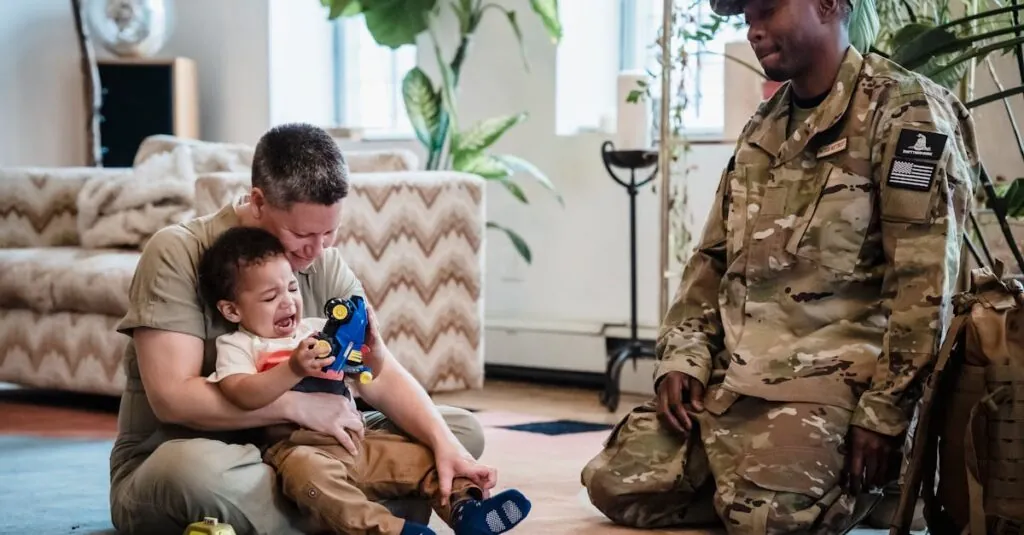In the whirlwind of life, everyone needs a breather—even caregivers. Enter respite care fostering, a game-changer for families juggling the demands of caring for children with special needs. It’s like a mini-vacation for both the kids and their caregivers, allowing everyone to recharge their batteries while knowing that the kids are in safe hands.
Table of Contents
ToggleUnderstanding Respite Care Fostering
Respite care fostering supports families with children who have special needs. This care allows caregivers to take breaks while providing children with secure and nurturing environments.
Definition and Purpose
Respite care fostering refers to temporary care for children in foster families while their primary caregivers rest or address other obligations. It primarily aims to reduce caregiver stress and prevent burnout. Providers offer a safe home for children, ensuring they receive consistent support during their stay. While enjoying time away from home, children engage in activities that promote their development and well-being. Overall, respite care fosters a balance between care demands and personal needs for families.
Importance in the Foster Care System
Respite care fostering plays a crucial role in the overall foster care system. It enhances the stability of placements by providing foster parents with needed breaks. When foster caregivers recharge, they improve their ability to meet children’s needs. This type of care can also help prevent the disruption of placements, ensuring children experience continuity in care. By maintaining a network of respite care providers, foster families gain access to resources that bolster their capacity to care for children with complex needs.
Benefits of Respite Care Fostering
Respite care fostering provides multiple advantages for both caregivers and children. This type of care ensures everyone involved maintains better emotional health.
Support for Foster Families
Support for foster families becomes essential in managing the challenges of caregiving. Respite care offers temporary relief, enabling caregivers to take necessary breaks. Access to this relief improves caregivers’ mental health, ultimately benefiting the children they care for. Increased availability of resources through respite care alleviates stress while allowing caregivers to recharge. Enhanced emotional well-being leads to better interactions with children, fostering a more supportive home environment.
Enhancing Child Well-being
Enhancing child well-being is a primary benefit of respite care fostering. Children experience stability in their routines through structured and safe temporary placements. Opportunities for social interaction arise during respite stays, enabling children to build relationships with peers. Activities often include educational and recreational programming, contributing to their developmental growth. As children receive support, their behavior and emotional health improve, resulting in a more positive atmosphere for long-term placements.
Challenges in Respite Care Fostering
Respite care fostering presents various challenges for both caregivers and children. Understanding these difficulties is crucial for maximizing the benefits of respite care.
Common Concerns
Caregivers often worry about the continuity of care. They may fear that children won’t adjust to new placements, impacting emotional stability. Trust issues can arise, as caregivers might hesitate to leave their children with unfamiliar foster families. Maintaining consistent communication also becomes a priority. Caregivers frequently express concerns regarding the safety and security of their children in respite care. The potential for disruptions in routine poses another challenge, as children thrive on familiarity.
Addressing Potential Barriers
Overcoming obstacles is essential for effective respite care fostering. Providing training for foster families can improve confidence in handling unique needs. Access to resources and information about respite care can empower caregivers. Clear guidelines must exist to ensure proper communication between primary and respite caregivers. Building community support networks strengthens relationships and encourages collaboration. Lastly, addressing financial concerns through assistance programs can enhance participation, making respite care more accessible for those in need.
Best Practices for Respite Care Providers
Effective respite care requires adherence to several best practices. Focus on training and support for foster caregivers, as this foundation enhances the overall quality of care for children.
Training and Support
Training for respite care providers equips them with essential skills to manage diverse needs. Workshops on child development, emotional support techniques, and behavior management contribute to caregiver confidence. Access to resources allows caregivers to learn about local support services and navigate challenges effectively. Regular communication with experienced foster families cultivates an environment of shared knowledge and approaches. Providing ongoing support through mentorship programs helps caregivers feel more competent in their roles and reassures families that their children are in capable hands.
Building Strong Relationships
Building strong relationships between caregivers and children lays the groundwork for positive experiences. Trust development occurs when caregivers foster open communication and active listening. Engaging in play and shared activities creates opportunities for bonding. Establishing continuity through consistent care routines minimizes anxiety and promotes security in children. Encouraging familial involvement during respite periods fosters familiarity and ensures children feel connected to their home environment. Strong relationships translate to improved emotional well-being and better coping skills for children during transitions.
Conclusion
Respite care fostering plays a crucial role in supporting families with children who have special needs. By providing temporary relief for caregivers it ensures that both children and their families can thrive. The positive impacts on emotional well-being and child development are significant.
Through effective training and community support, respite care can address common concerns and enhance the overall experience for both caregivers and children. This approach promotes stability and continuity in foster care placements, ultimately benefiting everyone involved. Embracing respite care fostering not only reduces caregiver stress but also enriches the lives of children, paving the way for healthier family dynamics and a brighter future.










